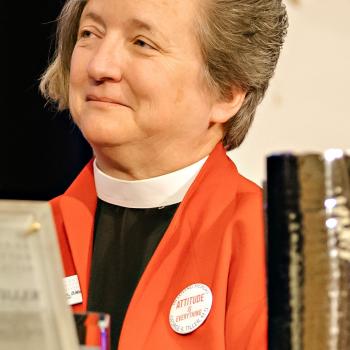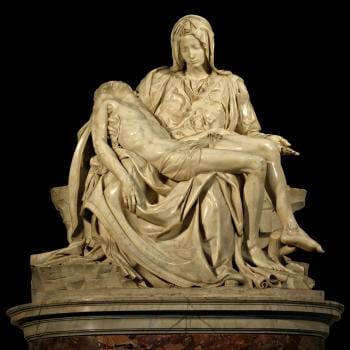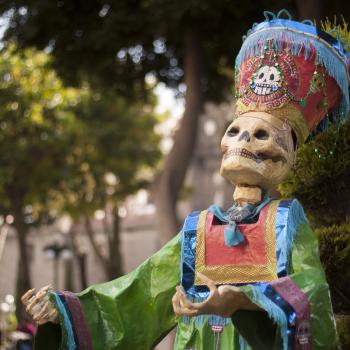Dear Professor Lewis,
Over the years I have read your books with delight. I owe you an enormous debt of gratitude. Your mixture of wit, common sense and vast learning has instructed and inspired me, and the simple beauty of your vision and clarity of your writing has lifted me up and not a few times moistened my eyes.
I read your letter to Mr Stebbins with some interest. I am myself a convert to the Catholic faith. I know how much you relish conversation with a bit of spice, and I’m sure you won’t mind if I try to pick you up on a few points.
Your analogy of a Platonic society in Athens is intruiging, but it doesn’t allow for the dynamic and continually inspired aspect of Catholic self understanding. The difference is this: Plato is dead. Jesus Christ is not. The Catholic Church claims to be the Body of Christ, inspired daily by the Holy Spirit. Your imagined Platonic Society (no matter how ancient) is merely a literary association. Because the Body of Christ subsists in the Catholic Church we believe that she has the power not only to interpret the Scriptures accurately, but to develop doctrine. I’m sure by now you have had some very interesting discussions with another Oxford man…John Henry Newman. On earth you would most certainly have read his essay on the Development of Doctine. You do not need me to outline his points, but he explains better than I ever can how doctrine develops in the church, and why development of doctrine is not only permissable, but necessary.
All of the aspects of Catholicism which appear to you to be either modern or in variance with the New Testament can easily be shown to have their roots in the apostolic tradition. I must admit, I am surprised that you have not spent more time exploring the real beliefs of the Catholic faith, and how they are rooted in Scripture. Perhaps it is the fault of our own Catholic Biblical scholars that we have not made this clear enough.
Our Marian doctrines do not seem unscriptural to us. There are really only three options: first that the whole number of educated Catholic scholars and bishops are mistaken; second, that we have intentionally believed something which we know to be contrary to Scripture or third, the Marian doctrines are not, in fact, contrary to Scripture even though it “seems” so to you. Could it be that you have not researched this particular area of Catholic belief satisfactorily?
You also reject our “papalism” because in the New Testament Paul reproves Peter. Professor Lewis, this argument does not do you credit! Catholics have always believed that the Pope functions in council with the other apostles, and that internal apostolic consultation is how papal infallilbility actually works. Furthermore, it is clear that after receiving his call the apostle Paul actually went to Jerusalem to seek the sanction of the apostolic Church with Peter at its head.
You object to transubstantiation because it is not in the New Testament. Again, you should know better. We do not believe that transubstantiation is anything more than an attempt to give a philosophical explanation for what is essentially a sacred mystery. Of course it is not in the New Testament per se, but what is there are the simple words, “This is my body.” Transubstantiation is merely our attempt to explain how this can be.
Are you not being somewhat disingenuous in declaring the Catholic Church to be a sect as localized as any Protestant sect? It may appear to you to be particularly “Roman” as Anglicanism is particularly English, but you neglect the antiquity and universality of the Catholic Church around the world today and down the ages.
But these particular points are minor in comparison to your foundational problem. With respect, Professor Lewis, you reject the pope, but you set yourself up as your own pope. Allow me to explain my charge: You say you reject the Catholic theology of the Virgin Mary “because it seems utterly foreign to the New Testament”. The crucial word here is “seems”. Is this not a dangerous form of relativism? When you use the word “seems” don’t you really mean “seems to me”?
You wish to preserve and proclaim ‘mere Christianity’ but who is to define what that is? Shall you? If so, what authority have you to do so, and by what criteria will you define this simple collection of core truths? Shall we have the Scriptures, but not the sacraments? If so, what shall we do with those Scriptures that say the Sacraments are essential to salvation? If we do have the sacraments how shall we decide what is a valid sacrament, what it means and how it is administered?
Shall we have the creeds but not the Church? Then how can we explain the fact that the creeds are defined by the Church? If we do have the Church how shall we choose which Church? In your book Mere Christianity you say we must choose according to which Church is most true, not according to personal preference, but haven’t you yourself chosen according to personal preference?
Can we have the apostolic teaching but not the apostolic succession? How so since the apostles and their immediate successors teach apostolic succession? If we do have apostolic succession mustn’t we ask ourselves where those successors are most likely to be found today?
Shall we have the dogma of the incarnation defined at the councils of the fourth century, but reject the Marian doctrines also promulgated at the same time by the same church?
Or shall we simply go by what “seems” to be true to Mr Lewis?
You will understand that my vote goes with your friends Professor Tolkien and Doctor Havard.
Respectfully yours,
Revd. Dwight Longenecker










